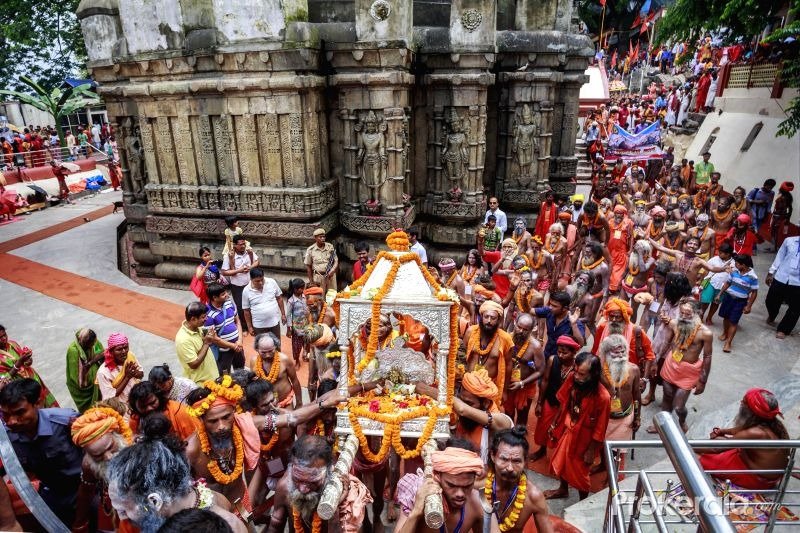As the sacred hills of Nilachal prepare to welcome lakhs of devotees for the revered Ambubachi Mela 2025, the Assam government has made a bold, thoughtful move, stripping the event of VIP privileges and embracing the spirit of equality and devotion. For many, this isn’t just a festival. It’s a spiritual homecoming and this year, it feels more grounded than ever.

The Heartbeat of Kamakhya
Every summer, the Kamakhya Temple in Guwahati becomes a focal point of spiritual energy as it observes the Ambubachi Mela, a celebration that marks the annual menstruation of the goddess Devi Kamakhya, believed to embody feminine energy and fertility. It’s a unique festival, not about grandeur or spectacle, but about acknowledging the sacredness of nature, womanhood, and the cycles of creation.
Devotees from all walks of life gather for four days of spiritual discipline, abstinence, and prayer. From ascetics and tantriks to pilgrims and curious tourists, Kamakhya’s doors, metaphorically and literally remain closed during this time, reflecting the goddess’s retreat into rest. When reopened, it signifies renewal, much like the human body and spirit.
A New Era: Maha Ambubachi Mahayog
This year, the festival has been rebranded as the ‘Maha Ambubachi Mahayog’, signaling a transition from a typical religious gathering to a more organized and spiritually expansive observance. Assam Tourism Minister Ranjeet Kumar Dass, who chaired a high-level review meeting on June 2, confirmed that this transformation reflects the government’s intent to enhance the experience while preserving its sanctity.
The festival will be held from June 22 to 26, with the spiritual observance formally beginning at 2:56 PM on June 22 and concluding at 3:00 AM on June 26. Dass also mentioned that a final round of preparations and decisions would be made during an on-site temple visit on June 9.
The New Rules: Respect and Discipline
To ensure the sanctity and smooth conduct of the Maha Ambubachi Mahayog, the Assam government has introduced several new rules this year. Most notably, VIP and VVIP passes have been completely banned, meaning no special access or privileges will be granted, all devotees, regardless of status, will participate equally.
Additionally, authorities have banned open-sole footwear like sandals near the temple premises. This move is intended to maintain both security and spiritual decorum around the sacred site. Pilgrims are advised to either wear closed footwear or walk barefoot as a gesture of respect.
The administration has also prepared for weather-related disruptions. If heavy rains make certain routes unsafe, such as the Pandu road, they will be closed, and devotees will be guided through two designated alternative paths. These measures aim to prioritize safety while maintaining order in the crowded hill area.
Though COVID-19 protocols have been lifted, officials clarified that if any health advisories are reintroduced, they will be enforced strictly.
Prepared for the Masses
To support the expected surge in pilgrims projected to exceed last year’s 7 lakh visitors, the government has allocated a budget of ₹4.55 crore. A total of 24 departments have been assigned duties, from water supply and sanitation to crowd control and health services.
Minister Dass announced plans for four major pilgrim camps at Pandu, Kamakhya Railway Station, Sonaram Field, and Hatigaon. A dedicated communication cell will also be launched to keep pilgrims informed and provide assistance as needed.

A Return to Spiritual Simplicity
Dass reiterated that the Maha Ambubachi Mahayog is not a fair or a commercial celebration. “It is a maha yog, a sacred alignment of spiritual energy. We urge everyone to treat it that way,” he said. “This is not about spectacle; it’s about surrender.”
This symbolic shift from spectacle to spirit encourages reflection, silence, and reverence rather than crowds, photo ops, or celebrity appearances.
Safety, Sensitivity, and Shared Responsibility
Devotees have been urged to maintain discipline and avoid unnecessary commotion inside temple premises. “This is a sacred time, not a social gathering. Let’s respect the space, the energy, and each other,” said a representative of the Doloi Samaj, the traditional custodians of the temple.
The administration has appealed for full cooperation from all pilgrims to preserve the sanctity of the event. Mutual respect, silence during rituals, and attentiveness to temple customs are expected from every participant.
Final Thoughts: A Pilgrimage of the Heart
Ambubachi Mela has always been more than a festival. It’s a deeply personal, transformative experience for those who journey to Kamakhya in search of blessings, answers, or inner peace. This year, as the Maha Ambubachi Mahayog, it invites everyone — not just to witness the divine, but to walk with it.
And in that shared journey, barefoot or otherwise the truest essence of Ambubachi is found: not in the crowd, but in the quiet moment of connection between the devotee and the goddess.

